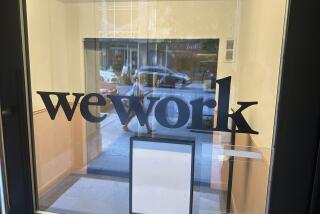Wheeling-Pittsburgh Chairman Testifies in Bankruptcy Court : Steel Firm May Face Liquidation
PITTSBURGH — Wheeling-Pittsburgh Steel Chairman Dennis J. Carney told a federal bankruptcy court Monday that his company would be forced into Chapter 7 liquidation without a sharp reduction of labor costs.
Carney told U.S. Bankruptcy Judge Warren W. Bentz that “it’s difficult, if not impossible, for Wheeling-Pittsburgh to survive” with a wage rate higher than $15.20 per hour, which is the company’s latest proposal to the United Steelworkers and 30% below the workers’ current $21.40 an hour.
“In a speech in July, I said if we don’t do something about wage rates, we were headed to bankruptcy. We didn’t do anything about wage rates, and we’re in bankruptcy,” Carney said.
Now, “if we don’t so something about wage rates, we’re headed for liquidation,” Carney said.
Under Chapter 7 of the U.S. Bankruptcy Code, a company sells all of its assets to pay as much of its debts as possible.
In what is considered the first major test of 1984 revisions in the code, Wheeling-Pittsburgh, which filed for reorganization under Chapter 11 in April, wants Bentz to allow it to dissolve its labor agreement, giving it a free hand to dictate wage and benefit rates and working conditions in order to remain a going concern.
Earlier, a union attorney told Bentz that Wheeling-Pittsburgh should not be allowed to dissolve its contract with 18,000 union members because the company has failed to meet the legal requirements to do so.
Union attorney Michael Gottesman said that, by disregarding legal requirements that employees, banks and other creditors receive equal treatment in the reorganization, Wheeling-Pittsburgh would be “gobbling in profits on the hides of their workers” unless its worst economic forecasts come true.
Cost $75 Million a Year
The company has asked the union to agree to slash wages and benefits to $15.20 an hour for five years with no provision to restore the cuts should it emerge from Chapter 11 and become profitable, he said.
“They’re saying ‘We’re putting you down on the floor and that’s where you will stay regardless of what happens,”’ Gottesman said.
The cuts would cost the union members an estimated $75 million per year in wages and fringe benefits without equal sacrifice from the banks and insurance companies that were owed $514 million when Wheeling-Pittsburgh filed under Chapter 11, he said.
“The question is not whether the contract needs to be adjusted. The question primarily is whether the company is asking more than is required,” Gottesman said. “The employees will not deny the company what the union’s experts say the company needs. They want this company to succeed.”
If the contract, which has one year remaining, is dissolved, union members would be free to go on strike if negotiations fail to produce a labor agreement.
The bankruptcy code, revised last July to give bankruptcy courts power previously held by company officials to dissolve contracts during Chapter 11 proceedings, also requires that the two sides negotiate for 60 days before management petitions for contract rejection, Gottesman said.
Yet Wheeling-Pittsburgh officials gave union negotiators only three weeks to consider its contract proposal before filing to reject the pact, Gottesman said.
During that period, company officials gave union negotiators certain financial information as required by the law. But Wheeling-Pittsburgh officials at one point changed their minds and denied the union more information.
Depositions produced the data, but the refusal delayed the union from formulating its response.
More to Read
Inside the business of entertainment
The Wide Shot brings you news, analysis and insights on everything from streaming wars to production — and what it all means for the future.
You may occasionally receive promotional content from the Los Angeles Times.










